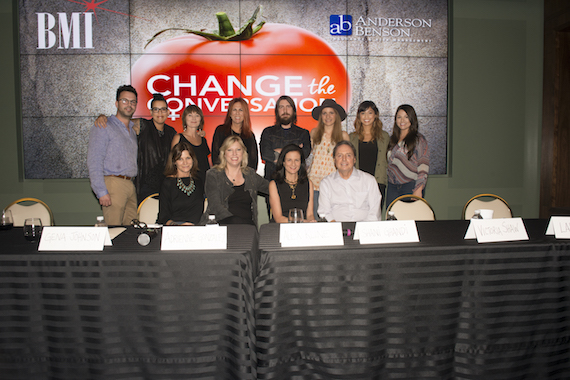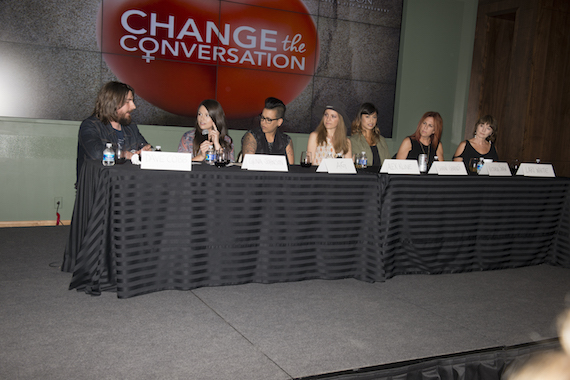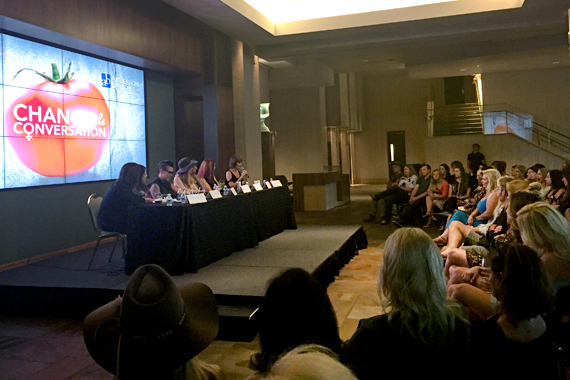

BMI Nashville hosts Change The Conversation on Wednesday, Aug. 3. Photo: Beth Gwinn
While Nashville coalition Change The Conversation has brought widespread attention over the past couple of years to the lack of female artists gaining traction at country radio, the realm of music producing and engineering is still largely male-dominated.
On Wednesday night (Aug. 3), BMI’s Nashville office welcomed female producers and engineers Adrianne Gonzalez, Victoria Shaw, Lari White, Alex Kline, Shani Gandhi and Gena Johnson for a panel titled Women Behind The Board: A Conversation on Producing and Engineering. It was moderated by Dave Cobb, known for his production work with Jason Isbell, Lori McKenna, Sturgill Simpson, and Chris Stapleton.
Many women on the panel pursued full-time artist careers before shifting into the world of producing and engineering.
“I realized I didn’t want to hear myself sing anymore,” shared Gonzalez, who released several projects, both solo and as part of The Rescues. As a producer and engineer, Gonzalez’s work has appeared in many films and TV shows. “I started calling myself an engineer and producer because I had already produced my own music, so I didn’t think producing someone else should be that different.”
Producer/engineer Alex Kline was a member of The Lunabelles. The group had signed to BNA and released the single, “A Place To Shine.” Kline soon found herself on stages across the country, opening for labelmate Kenny Chesney. While on the road, she realized much of her time was spent not working on new music, but performing songs the group had already written.
“I enjoy creating each night, versus re-creating every night,” she said. Kline has had songs recorded by Ronnie Dunn, Lonesome River Band and Jess Moskaluke. Kline produced BMLG artist Tara Thompson’s latest album, and co-wrote Thompson’s first single, “Someone To Take Your Place.”

Pictured (L-R): Dave Cobb, Gena Johnson, Adrianne Gonzalez, Alex Kline, Shani Gandhi, Victoria Shaw and Lari White. Photo: Beth Gwinn
Nearly all of the women on the panel mentioned they had been passed over for certain projects. Several noted they felt that a rejection often had more to do with the quality of the work, or with the working relationship with a label, manager or artist, rather than gender.
Gandhi, who has worked on projects by Frankie Ballard, Will Hoge and Sarah Jarosz, said she often “learns the most from losing.” Gandhi competes for the opportunity to work on various projects, turning in mixes that are compared with the work from male engineers. “Sometimes I feel my work is better, but they chose what they think is best. Other times, I’ll hear another person’s version and I’ll think they did a great job, and I’ll go to them and ask, ‘How did you do that?’”
“I think it’s more of a trust issue,” said White, who made history as the first female producer to produce a superstar male artist, when she co-produced Toby Keith’s 2006 project White Trash With Money. “The labels’ business model is worse than roulette. It’s dismal, so it’s natural to want to go with the producer who just produced a top song or top project.”
Keith heard White’s 2004 album Green Eyed Soul and asked if she would produce a couple of tracks for him. “Toby and I shared the stage as artists and sang a duet ‘Only God Could Stop Me Loving You’ [from White’s 1998 album Stepping Stone] so we had a friendship. It goes back to trust.”
Keith went to her Nashville studio and cut three songs in four hours. By lunch, he had asked her to re-book the musicians for additional sessions to work on the whole album.
White said, “It was a total experiment, but he told me he had had more fun in the studio than he had had in a while. Some of those tracks we worked on he had already cut twice and he wasn’t happy with it.”
“Music is not a democracy, ever,” Cobb interjected.
“You might make a product,” White agreed, “but it didn’t work for me.”

Photo: Beth Gwinn
Cobb and the panelists also discussed the importance of making artists comfortable with them as producers.
“I get them to talk about their feelings and what they are going through,” said Gonzalez. “If they are pissed about something, use that. I could talk about feelings for hours.”
“Alcohol always helps a bit,” Cobb quipped. “I learned quickly that just taking them out to a bar and talking helps.”
Everyone on the panel agreed that the key to getting more work is to focus on quality work, rather than gender issues.
Shaw, a superstar songwriter in her own right, placed high value on quality during the five years she spent developing the superstar trio Lady Antebellum. She began working with then 16-year-old Hillary Scott, even before Scott began collaborating with bandmates Charles Kelley and Dave Haywood. After the trio formed, Shaw encouraged them to keep writing. “My goal was an album of single-worthy songs,” Shaw said.
The women also praised the work of Change The Conversation for highlighting the lack of females on the radio and behind the scenes in certain sectors of the music industry.
“When you bring attention to it, it holds their feet to the fire,” said Gonzalez.
Shaw says that the lack of females on country radio represents an opportunity and a challenge to female artists to work harder, to excel at their craft, and to make themselves more unique as artists.
“The female artists that are successful and on radio are unique and they are good,” said Shaw. “Women, we have to be better. We have to be better, but what’s so bad about that?”

Category: Featured
About the Author
Jessica Nicholson serves as the Managing Editor for MusicRow magazine. Her previous music journalism experience includes work with Country Weekly magazine and Contemporary Christian Music (CCM) magazine. She holds a BBA degree in Music Business and Marketing from Belmont University. She welcomes your feedback at jnicholson@musicrow.com.View Author Profile


